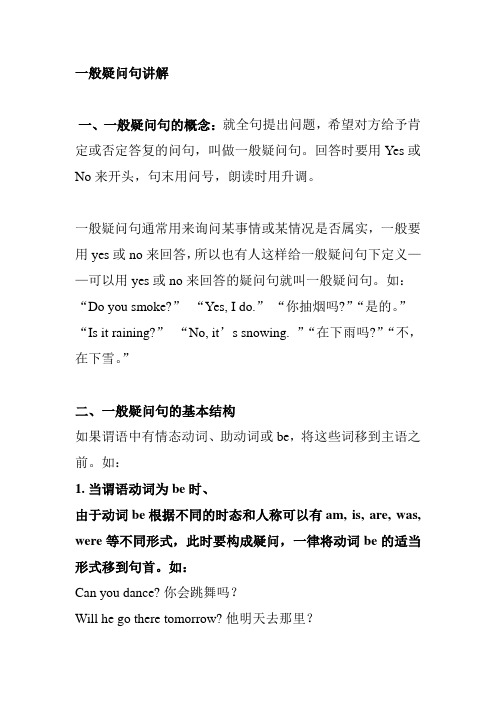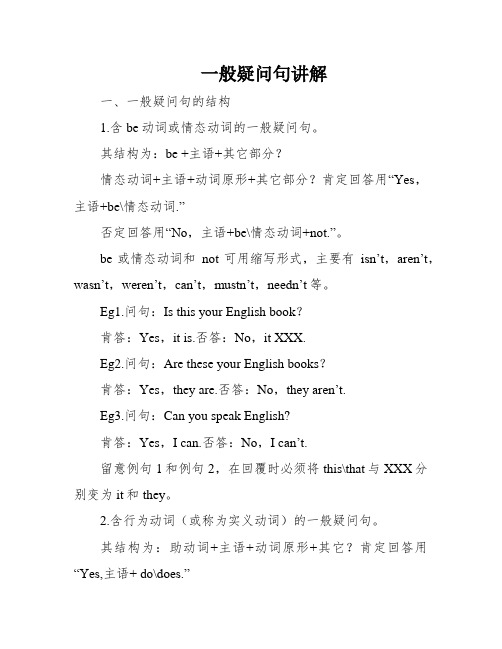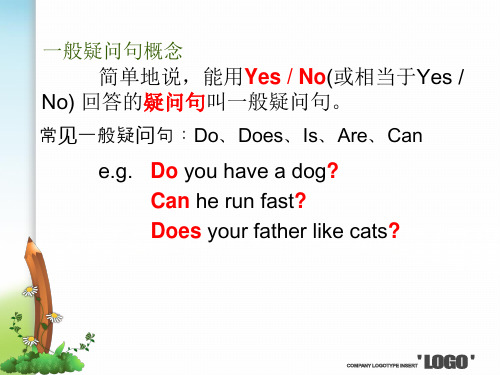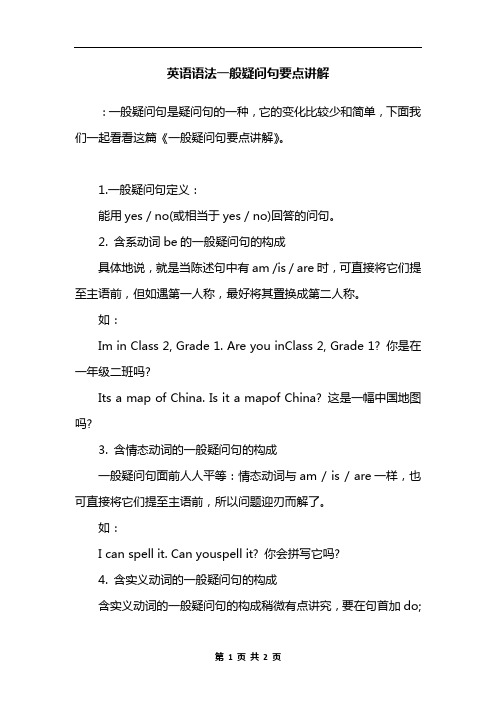一般疑问句讲解
一般疑问句讲解及专项练习

练习在阅读理解中找出并理解一般疑问句,提高阅读理 解能力。
04 一般疑问句常见错误及纠 正方法
主谓不一致错误
错误示例
Does he like playing football and swimming?
纠正方法
当主语为第三人称单数时,助动 词does应与主语保持一致,但 like应为原形。正确句子为: Does he like playing football and swimming? (他喜欢踢足球
助动词do/does的误用
当句子中有实义动词时,需要使用 助动词do或does来构成一般疑问 句,注意根据主语人称和数选择正 确的助动词。
否定回答中缩写形式的误用
在否定回答中,常使用缩写形式, 如aren't、isn't、don't等,注意 缩写形式的正确书写。
肯定回答中人称代词的误用
在肯定回答中,应使用相应的人称 代词以避免重复,如Are you a student? Yes, I am.
VS
与特殊疑问句关系
一般疑问句与特殊疑问句都是疑问句的一 种,但它们在结构和用法上有所不同。特 殊疑问句需要用特殊疑问词来引导,而一 般疑问句则不需要。此外,特殊疑问句的 回答通常比较具体,而一般疑问句的回答 则比较简单,通常用Yes或No来回答。
02 一般疑问句分类及用法
Be动词引导疑问句
Be动词置于句首
在省略句中构成一般疑问句
在省略句中,需要根据上下文语 境来判断省略的成分,并正确构 成一般疑问句。
THANKS FOR WATCHING
感谢您的观看
否定词使用不当
错误示例
Isn't he comes from China?
一般疑问句讲解

一般疑问句讲解一、一般疑问句的概念:就全句提出问题,希望对方给予肯定或否定答复的问句,叫做一般疑问句。
回答时要用Yes或No来开头,句末用问号,朗读时用升调。
一般疑问句通常用来询问某事情或某情况是否属实,一般要用 yes 或 no 来回答,所以也有人这样给一般疑问句下定义——可以用 yes 或 no 来回答的疑问句就叫一般疑问句。
如:“Do you smoke?”“Yes, I do.”“你抽烟吗?”“是的。
”“Is it raining?”“No, it’s snowing. ”“在下雨吗?”“不,在下雪。
”二、一般疑问句的基本结构如果谓语中有情态动词、助动词或be,将这些词移到主语之前。
如:1. 当谓语动词为be时、由于动词be根据不同的时态和人称可以有am, is, are, was, were等不同形式,此时要构成疑问,一律将动词be的适当形式移到句首。
如:Can you dance? 你会跳舞吗?Will he go there tomorrow? 他明天去那里?Are you a student? 你是学生吗?He is sleeping. 他在睡觉。
→Is he sleeping? 他在睡觉吗?They were very busy. 他们很忙。
→Were they very busy? 他们很忙吗?2. 当谓语动词为实义动词时如果谓语中没有情态动词、助动词或be,就在主语前加助动词do(does、did) ,原来的动词都用原形。
如:当谓语动词为实义动词时,通常应根据不同时态和人称在句首加助动词do, does, did等。
如:Do you like English? 你喜欢英语吗?Does your brother like English? 你的兄弟喜欢英语吗?Did you sleep well last night? 你昨晚睡得好吗?We go to school every day. 我们每天都去上学。
一般疑问句的讲解

一般疑问句的讲解及练习一、什么是一般疑问句?以Be动词(am is are),助动词(do / does/ did / have/has),情态动词(can/must/should)开头的句子,而且用Yes或No来回答,读升调的句子就是一般疑问句。
译成汉语,都可以带上“吗”,例如上面三句可分别译为:例:1)Is your father a teacher?你父亲是老师吗?二、由陈述句变一般疑问句的规则:①第一步“找”,看看句中有没有be动词(am/is/are),助动词(do/does/have/has),情态动词(can/must/should)这些词,如果有,就直接将这些词放在句子的开头,句末打上问号。
1)找be动词(am/is/are),如果有be动词,就把be 动词提到句子的第一位,其它部分照抄,把最后的句号变成问号。
②注意人称的变化:一变二,二变一,三不变,some变成any把句子的“我I”换成”你’you“我们we换成你们you我的my换成你们your我们的our换成你们的your”some变成any③注意第一个首字母要大写,句子末尾的“句号.”换成“问号?”■由be动词引导的一般疑问句Be(am/is/are)+主语+其它+?肯定回答:Yes,主语代词+Be动词+句号否定回答:No,主语代词+be动词+not.例如:It is rainy today.→Is it rainy today?■由情态动词引导的一般疑问句:情态动词+主语+动词原形+其它+?(1)肯定回答:Yes,主语代词+情态动词+句点(2)否定回答:No,主语代词+情态动词+ not . 口诀:一提二换三照抄一提:将情态动词提到句子开头;二换:将第一人称换成第二人称;三照抄:陈述句剩下的都照抄例句:①Can you swim?Yes, I can./No, I can not.②Should I walk in the road?No, you should not.③We can playfootball.变成一般疑问句:Can you play football? ④Tom's father can play the piano.→Can Tom's father play the piano?■如果句中有没有be动词(am is are),助动词(do does have has),情态动词(can),则根据谓语动词的形式借助do 或does放句首。
一般疑问句讲解

一般疑问句讲解一、一般疑问句的结构1.含be动词或情态动词的一般疑问句。
其结构为:be +主语+其它部分?情态动词+主语+动词原形+其它部分?肯定回答用“Yes,主语+be\情态动词.”否定回答用“No,主语+be\情态动词+not.”。
be或情态动词和not可用缩写形式,主要有isn’t,aren’t,wasn’t,weren’t,can’t,mustn’t,needn’t等。
Eg1.问句:Is this your English book?肯答:Yes,it is.否答:No,it XXX.Eg2.问句:Are these your English books?肯答:Yes,they are.否答:No,they aren’t.Eg3.问句:Can you speak English?肯答:Yes,I can.否答:No,I can’t.留意例句1和例句2,在回覆时必须将this\that与XXX分别变为it和they。
2.含行为动词(或称为实义动词)的一般疑问句。
其结构为:助动词+主语+动词原形+其它?肯定回答用“Yes,主语+ do\does.”否定回答用“No,主语+don\does not.”。
助动词也常用缩写形式,主要有don’t,doesn’t,didn’t等。
Eg4.问句:Do your parents like English?肯答:Yes,they do.否答:No,they don’t.三、如何将陈述句变为一般疑问句?1、含be动词或情态动词的句子秘诀:一调二改三问号一调:即把句中的be或神态动词调到主语前;二改:更换主语称呼,行将句中的主语I\my \mines\we\our\ours品级一人称分别改为响应的第二人称you\your\ yours等;三问号:句末的句号改为问号。
Eg6.I am an English teacher.→Are you an English teacher?Eg7.We can XXX、含行为动词(或称为实义动词)的句子秘诀:一加二改三问号一加:即在句首加助动词Do或Does;二改:1、把谓语动词改为真相;2.更换主语称呼三问号:句末的句号改为问号。
一般疑问句的讲解

一般疑问句的讲解
1. 啥是一般疑问句呀?就比如“你吃饭了吗?”这就是个很典型的一般疑问句呀!它就是在问你一个问题,需要你给出是或不是的回答呢。
2. 一般疑问句是不是很简单易懂呀?像“今天天气好吗?”这样的句子,一下子就能明白是在询问天气情况呢。
3. 嘿,你说一般疑问句是不是经常出现在我们生活中呀?“你喜欢看电影吗?”这不就是和朋友聊天时常会说的嘛。
4. 一般疑问句有啥特点呢?就像“他会来吗?”这种,总是带着一种不确定,等着你来给出答案呀。
5. 哇,一般疑问句真的很有趣呢!比如说“这个蛋糕好吃吗?”,能引发大家对蛋糕味道的讨论呀。
6. 一般疑问句是不是特别实用呀?“你能帮我一下吗?”在需要别人帮忙的时候就派上用场啦。
7. 哎呀,一般疑问句真的到处都是呢!“明天要上学吗?”这可是学生们经常会问的呀。
8. 一般疑问句的作用可大了呢!像“你带钥匙了吗?”,能避免很多不必要的麻烦呀。
9. 一般疑问句难不难理解呀?“那本书你看过吗?”这样的句子,谁都能明白是在问啥吧。
10. 一般疑问句真的很重要呀!“你知道这件事吗?”没有它我们怎么交流很多信息呢。
我的观点结论:一般疑问句是我们日常交流中非常重要且常用的句式,它简单易懂又实用,能帮助我们获取信息、展开讨论、请求帮助等,我们一定要好好掌握它呀!。
一般疑问句和特殊疑问句讲解及练习

一般疑问句一、一般疑问句用Yes或No作答的疑问句叫一般疑问句;其结构是be动词am/is/are//+主语+其他成分通常回答为:肯定:Yes,+主语+提问的词.否定:No,+主语+提问的词+not.AreyoufromJapan﹖Yes,Iam./No,I'mnot.Ishersisterdoingherhomeworknow﹖Yes,sheis./No,sheisn't.Doesheworkinabank﹖Yes,hedoes./No,hedoesn't.CanyouspeakFrench﹖Yes,Ican./No,Ican't.一.要将陈述句变成一般疑问句,可以遵循下列步骤:1.如句中有be动词am、is、are、was、werecan、may、must…可直接将它们提到句首,句末打上问号即可;主语为第一人称,应将其改为第二人称;例:Itwasrainyyesterday.→WasitrainyyesterdayTom'sfathercanplaythepiano.→CanTom'sfatherplaythepiano2.如果句中没有be动词、助动词或情态动词,则根据谓语动词的形式借助do的相应形式放在句首;具体方法是:如果谓语动词是原形,则借do;如果谓语动词是一般现在时第三人称单数形式,则借does;如果谓语动词是过去式,则借did.需要注意的是,借does或did后,原句的谓语动词要变回原形;例:Theygotoschoolbybike.→DotheygotoschoolbybikeBillgetsupat6:30everyday.→Doesbillgetupat6:30everydayThestudentssawafilmyesterday.→Didthestudentsseeafilmyesterday二.陈述句变一般疑问句应注意的事项1.如果陈述句中有第一人称,则变问句时最好要变为第二人称;例:Iusuallyhavelunchatschool.→DoyouusuallyhavelunchatschoolMyfatherisplayingsoccer.→Isyourfatherplayingsoccer2.如果陈述句中有some,则变问句时往往要变成any;例:Thereissomewaterontheplayground.→Isthereanywaterontheplayground3.复合句变一般疑问句通常只变主句,从句不变;例:IknowhecomesfromCanada.→DoyouknowhecomesfromCanada4.如果句中含实义动词have且表示“有”时,除借do外,也可将其直接提到句首;例:IhavesomefriendsinAmerica.→HaveyouanyfriendsinAmerica /Doyouhaveanyfrien dsinAmerica三.一般疑问句的回答1.第一个词:不是Yes就是No;有时根据语气的不同,Yes可由Sure,Certainly,Ofcourse等代替.NO可由sorry代替.2.第二个词:问谁答谁;即答语中的主语须与问句的主语一致必须用主格代词; 例:Doesshecleanherroomeveryday Yes,shedoes.IsAnna′sfatheradoctor No,heisn′t.如果主语是thisthat,回答时用it代替;Isthisyourpen Yes,itis.No,itisn't.如果问句中主语these,those,回答时用they代替;Arethoseyourbooks Yes,theyare.No,theyaren't.3.第三个词:用什么问,用什么答;即用问句中的提问词;CanJimplaysoccer Yes,hecan.DoesMrBeanspeakEnglish Yes,hedoes.需注意问题:用may引导的问句,肯定回答用may,否定回答用can′t或mustn′t,用must引导的问句,肯定回答用must,否定回答用needn′t/don’thaveto例:MayIgototheparknow Yes,youmay./No,youmustn′t. MustIwashmyclothesnow Yes,youmust./No,youneedn′t.4.作否定回答时,结尾要加上not;否定回答最好缩写,而肯定回答不能缩写; 例:DidThomascomehereyesterday Yes,hedid./No,hedidn′t.IsLinLininClass3 Yes,sheis./No,sheisn′t.特殊疑问句以疑问词开头,对句中某一成分提问的句子叫特殊疑问句;常用的疑问词有:what 什么,who谁,whose谁的,which哪个,when何时,where哪里,how怎样,通过...,why 为何等;特殊疑问句有两种语序:1.如疑问词作主语或主语的定语,即对主语或主语的定语提问,其语序是陈述句的语序:疑问词+主语+谓语动词+其他成分如:whoissingingintheroom﹖whosebikeisbroken﹖2.如疑问词作其他成分,即对其他成分提问,其语序是:疑问词+一般疑问句语序如:whatclassareyouin﹖Whatdoesshelooklike﹖Whereareyoufrom﹖Whattimedoeshegetupeverymorning﹖Howdoyouknow﹖注意:1.回答特殊疑问句时,不能用yes/no,即问什么答什么,尤其是简略回答;如:WhoisfromCanada﹖Helenis.Where'stherestaurant﹖Nearthestation.Whydoyoulikekoalas﹖Becausetheyarecute.一、陈述句变一般疑问句1.HisfatherisanEnglishteacher.___________________________________________2.Thesecatsarecrying.喊叫___________________________________________3.Theycanswim.___________________________________________4.Iliketoread阅读English.___________________________________________5.Igotoschoolonfoot.走路___________________________________________6.Thechildrenhadagoodtimeinthepark公园.___________________________________________7.Hisfathergoestoworkbybus.乘公共汽车___________________________________________8.Theboyunderthetree树ishungry.饥饿___________________________________________9.Hegoestoschooleveryday.___________________________________________10.Iwanttohaveamodelcar摩托车.___________________________________________11.Mrs.LiandKittywatchTVatnight在晚上.___________________________________________12Theboydoessomehousework家庭作业athome.___________________________________________二、把肯定句变为否定句1.HisfatherisanEnglishteacher.____________________________________________.2.Thesecatsarecrying.喊叫____________________________________________.3.Theycanswim.____________________________________________.4.Hisfathergoestoworkbybus.乘公共汽车_______________________________________________.5.Tomhassomeapples.___________________________________________.6.Thechildrenhadagoodtimeinthepark公园.___________________________________________.7.Mrs.LiandKittywatchTVatnight在晚上.___________________________________________.8.Theboydoessomehousework家庭作业athome.___________________________________________.三、作肯定和否定回答1、Isthisyourpencil-case肯定回答:___________________.否定回答:___________________.2、Isthathisbackpack肯定回答:___________________.否定回答:___________________.3、Aretheseherbrothers肯定回答:___________________.否定回答:___________________.4、ArethoseTom’s parents肯定回答:___________________.否定回答:___________________.5、Canyouplaytheguitar肯定回答:___________________.否定回答:___________________.6、DotheylikeFrenchfries肯定回答:___________________.否定回答:___________________.7、Doeshelikepears肯定回答:___________________.否定回答:___________________.8、MayIaskyourquestion肯定回答:___________________.否定回答:___________________.9、Isheyourfather肯定回答:___________________.否定回答:___________________.10、AreyoufromChina.肯定回答:___________________.否定回答:___________________.特殊疑问句习题:就划线部分提问1.Theyboughtanewbikeyesterday.____________________________________________________2.Sheismyteacher.___________________________________3.Itismycoat.______________________________________4.Iamlookingformysister.____________________________________________________5.Igetupatsix.____________________________________________________6.IamfromHubei.__________________________________________________7.IwenttoschoollatebecauseIgotuplate.____________________________________________________8.Iamgettingonwellwithit.____________________________________________________9.Mybagisred._______________________________________10.Theyarefiveyuan.______________________________________________________11.Iwashittwiceaweek.______________________________________________________12.Hewillbebackinfourdays._一般将来时一、单项选择1.Iftheycome,we________ameeting.A.haveB.willhaveC.hadD.wouldhave2.He________herabeautifulhatonhernextbirthday.A.givesB.gaveC.willgivingD.isgoingtogive3.He________tousassoonashegetsthere.A.writesB.haswrittenC.willwriteD.wrote4.–WillhisparentsgotoseetheTerraCottaWarriorstomorrow–No,________不去.A.theywilln’tB.theywon’t.C.theyaren’tD.theydon’t.5.Who________we________swimmingwithtomorrowafternoonA.will;goB.do;goC.will;goingD.shall;go6.We________theworkthiswaynexttime.A.doB.willdoC.goingtodoD.willdoing7.Tomorrowhe________akiteintheopenairfirst,andthen________boatinginthepark.A.willfly;willgoB.willfly;goesC.isgoingtofly;willgoesD.flies;willgo8.Thedayaftertomorrowthey________avolleyballmatch.A.willwatchingB.watchesC.iswatchingD.isgoingtowatch9.There________abirthdaypartythisSunday.A.shallbeB.willbeC.shallgoingtobeD.willgoingtobe10.They________anEnglisheveningnextSunday.A.arehavingB.aregoingtohaveC.willhavingD.isgoingtohave11.He________thereattentomorrowmorning.A.willB.isC.willbeD.be12.It________theyearofthehorsenextyear.A.isgoingtobeB.isgoingtoC.willbeD.willis13.________openthewindowA.WillyoupleaseB.PleasewillyouC.YoupleaseD.Doyou14.It________usalongtimetolearnEnglishwell.A.takesB.willtakeC.spendsD.willspend15.Thetrain________at11.A.goingtoarriveB.willbearriveC.isgoingtoD.isarriving二、用所给动词的一般将来时填空1.I______leaveinaminute.I______finishallmyworkbeforeI______leave.2.Iamafraidthere___________beameetingthisafternoon.Ican’tjoinyou.3.I___________betired.I___________gotobedearlytonight.4.Mary’sbirthdayisnextMonday,hermother__________giveherapresent.5.Itisverycoldthesedays.It___________snowsoon.6.—__________you__________beherethisSaturday—No.I___________visitmyteacher.7.—__________I________getyouacopyoftoday’snewspaper —Thankyou.情态动词1.—Mustweleavenow—No,we_______.Westillhavetwomorehours.A.can’tB.mustn’tC.needn’tD.shouldn’t2.—Canyourideahorse—No.I____.A.needn'tB.maynotC.can'tD.mustn't3.Youeatthesoupifyoudon'tlikeit.A.shouldn'tB.mustn'tC.needn'tD.can't4._____youwaitafewmoreminutes It'llbeyourturnsoon,A.MustB.ShouldC.CouldD.Might5.She_______behere.Isawhercomein.A.canB.mayC.shouldD.must6.Ican’tgotothecinemawithyoubecauseI___________stayhereuntilmymotherc omesback.A.canB.couldC.mayD.must7.—Bequiet,Mr.Smithiscoming.—Don’tworry.It___behim.Mr.Smithismuchtaller.A.mustn’tB.mustC.can’t8.—Hey,TedYou_______neverplayin thestreet.It’snotsafe.—Sorry,Mum.Iwon’tagain.A.needB.mustC.canD.may9.—HowlongmayIkeepthebook—You________keepitfortwoweeks.A.mayB.mustC.will10.—MayIsmokehere,please—Iamafraidyou.Thisisanon-smokingarea.A.canB.can’t C.mayD.maynot11.—MustIreturnthebookthisweek—No,you____.Youcan_itfor20days.A.mustn’t;keepB.needn't;borrowC.needn't;keepD.mustn't;borrow12.—CouldIuseyoureraserforawhile —Yes,ofcourseyou_.A.couldB.canC.willD.Should13—________IwatchTVnow,Mom—No.It’stoolate,andyou______gotobed.A.May;havetoB.Will;shouldC.Can;willD.Must;need14.—MustIfinishmyhomeworktoday,MsLiu—No,_______.A.youmustn’tB.youdon’thavetoC.youcan’t15.Accordingtothenewtrafficlaws,people______driveafterdrinkingwineorbe er.A.wouldn’tB.couldn’tC.needn’tD.mustn’t16.—Who’ssinginginthenextroom—It____beher.ShehasgonetoNewYork.A.can’tB.mustC.shouldn’tD.can。
一般疑问句讲解

No, I can not./No, I can’t.
3. Do you like rabbits?
Yes, I do.
No, I do not./No, I don’t. 4. Does Lucy like bananas?
Yes, she does.
No, she does not./No, she doesn’t.
答语 :
➢ 一般疑问句常用Yes或No回答.
➢ 肯定回答: Yes,主语+开头单词
➢ 否定回答: No,主语+开头单词 + not.
1.Is she a student? Yes, she is.
No, she is not./No, she isn’t. 2.Can you see a star?
一般疑问句概念 简单地说,能用Yes / No(或相当于Yes /
No) 回答的疑问句叫一般疑问句。
常见一般疑问句:Do、Does、Is、Are、Can
e.g. Do you have a dog? Can he run fast? Does your father like cats?
特殊疑问句
课堂作业(第一题全班做,第二题1.3.5.7组做第一小问,2.4. 6.8组做第二小问)
1、请找出下列句子中的一般疑问句。(写序号) (1)Is he a teacher? (2)What do you do at home? (3)Do you help your parents at ome? (4)What can you do for your parents? (5)Can you cook the dinner? 2、请写出以下句子的答语(肯定和否定) (1)Can he run fast? (2)Is Lu Hua playing with a cat?
英语语法一般疑问句要点讲解

英语语法一般疑问句要点讲解:一般疑问句是疑问句的一种,它的变化比较少和简单,下面我们一起看看这篇《一般疑问句要点讲解》。
1.一般疑问句定义:能用yes / no(或相当于yes / no)回答的问句。
2. 含系动词be的一般疑问句的构成具体地说,就是当陈述句中有am /is / are时,可直接将它们提至主语前,但如遇第一人称,最好将其置换成第二人称。
如:Im in Class 2, Grade 1. Are you inClass 2, Grade 1? 你是在一年级二班吗?Its a map of China. Is it a mapof China? 这是一幅中国地图吗?3. 含情态动词的一般疑问句的构成一般疑问句面前人人平等:情态动词与am / is / are一样,也可直接将它们提至主语前,所以问题迎刃而解了。
如:I can spell it. Can youspell it? 你会拼写它吗?4. 含实义动词的一般疑问句的构成含实义动词的一般疑问句的构成稍微有点讲究,要在句首加do;如逢主语为第三人称单数,谓语动词为一般现在时单数第三人称形式v-(e)s时,奉does为座上宾并要变回原形(如hashave,likeslike 等);有时陈述句中的some还要变作any等。
如:She lives in Beijing. Does shelive in Beijing? 她住在北京吗?I like English. Do you likeEnglish? 你喜欢英语吗?5. 少数口语化的一般疑问句如问一个与前文相同的问句时,可省略成And you?或What / How about...?等;甚至只抓关键词,读作升调。
如:Your pen? 你的钢笔?6. 小插曲:一般疑问句的语调大部分的一般疑问句都应读作升调(↗),并落在最后一个单词身上。
如:Is it a Chinese car↗?7. 一般疑问句的应答用yes / no(或相当于yes / no的词)回答,并怎么问怎么答(句首为情态动词am / is / are还是do /does),简略回答时要注意缩写(否定的nt)和采用相应的人称代词以避免重复:即Yes,主语(代词)+情态动词或am / is / are或do / does.表示肯定;No,主语(代词)+情态动词或am / is / are或者do / does not(nt).表示否定。
- 1、下载文档前请自行甄别文档内容的完整性,平台不提供额外的编辑、内容补充、找答案等附加服务。
- 2、"仅部分预览"的文档,不可在线预览部分如存在完整性等问题,可反馈申请退款(可完整预览的文档不适用该条件!)。
- 3、如文档侵犯您的权益,请联系客服反馈,我们会尽快为您处理(人工客服工作时间:9:00-18:30)。
3. Do you like rabbits?
Yes, I do. No, I do not./No, I don`t. 4. Does Owen like bananas?
Yes, he does. No, he does not./No, he doesn`t.
我会读书。
她会画画。
Do助动词
原形 第三人称 do does 1.Do you like apples? Yes, I do. 肯定回答 No,I don’t. 否定回答 2. Does she like bananas? Yes, she does . 肯定回答 No,she doesn’t. 否定回答
2. Tom likes peaches. Does Tom like peaches?
一般疑问句的肯定回答、 否定回答。 Yes,… +关键词。 No,…+关键词+not.
1.Is she a pupil? Yes, she is. No, she is not./No, she isn`t. 2.Can you see a star? Yes, I can. No, I can not./No, I can`t.
用 YES 或 NO 来 2.Can you draw? 回答的 --Yes, I can. / No, 问句 I can’t.
3.Do就是一般疑问句。 you like apples? --Yes, I do. / No, I don’t.
Judge and answer 判断下面的句子是否是一般疑问句,为什么?
把下面的句子改成一般疑问句:
1. This is a nice pear. 2. That Is this isa an nice ice-cream. pear? Is that an ice-cream? 3. I am a good boy. you a good boy? 4. Are I am from London. Are you from London? 5. The bear and the cat are cute. Are the bear and the cat cute? 6. The five fat dogs are on the desk. Are the five fat dogs on the desk?
Do some exercise
把下面的句子改成一般疑问句:
7. He is my friend. heis your friend? 8. Is She my teacher. Is she your teacher? 9. That is your storybook. 10. It Isis that your my umbrella. storybook? Is it my umbrella? 11. This is my sister, Nancy. Is this your sister, 12. He is my aunt, MrsNancy? Black. Is he your aunt, Mrs Black?
Be动词
I
she he it Tom th
is
are
we they the cats 可数名词复数
Can 情态动词
1.I can read. 2. She can draw. 3. They can jump. 4. We can hop.
他们会跳。 我们会单腿跳。
第一步:找
如 何 改 一 般 疑 问 句 ?
找到了 找 be动词、can
没找到
第二步:提
提 be动词、can 、 到句首(大写)
dodo 加 does does
①“句号”改“问号” 勿忘be动词 小诗 ②如果有第一、第二
人称,则互改。
第三步:改
第四步:抄
其他照抄 一字不漏
Do some exercise
一般疑问句,即 yes/no 问句
1.把关键词(如:am、is、are、 have、has、can)放在句子的开 头,句尾改为“?”但要注意一、 二人称的转换。
2.有“like”的句子改问句时,在 句子开头加“Do”或“Does”
ask and answer
1.Is this a book? --Yes, it is. / No, it isn’t.
Are you a student ? 1.Are Is it his rabbit ? 2.Is
3.What’s that over there? × Can they swim? ? 4.Can Do you have a storybook ? 5.Do 6.This is a toy bear, I think. ×
1. She is a pupil. Is she a pupil? 2. I can see a star. Can you see a star? 3. My mother is a teacher. Is your mother a teacher?
1. I like rabbits. Do you like rabbits.
